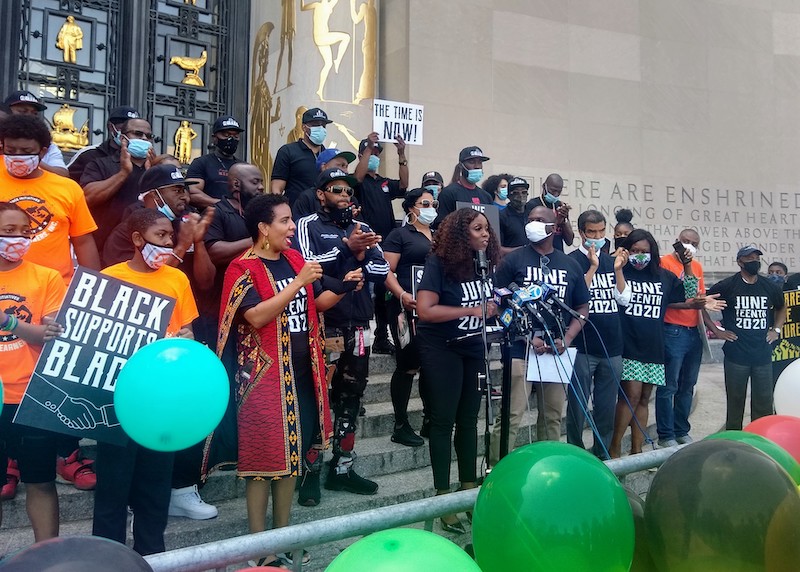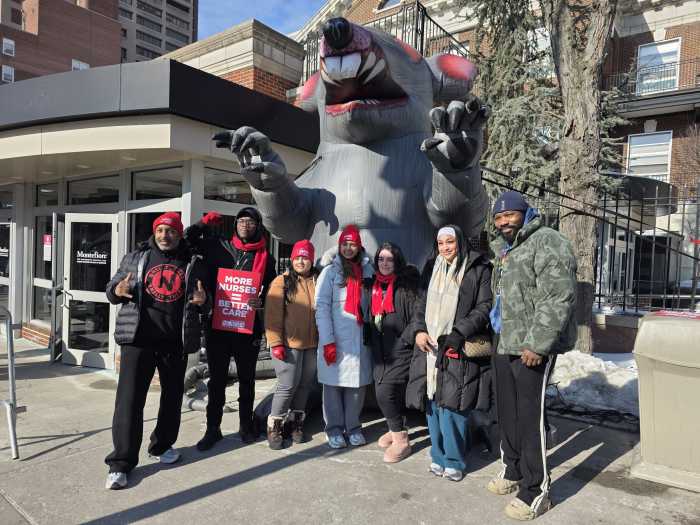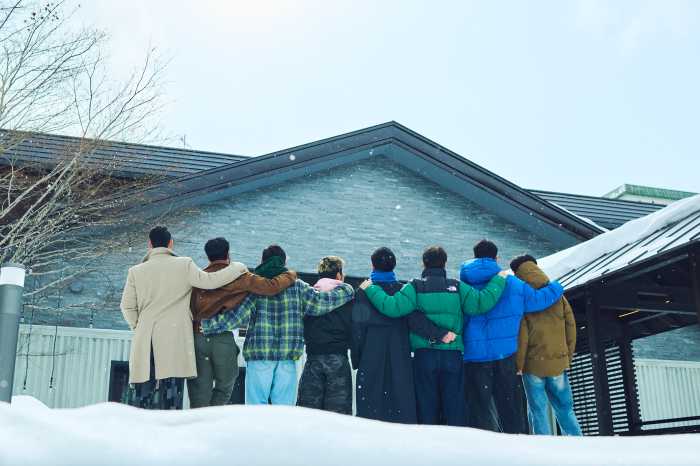June 19 or Juneteenth, is a holiday, two years after the emancipation proclamation was signed in 1863, that marks the day almost 2,000 Union soldiers arrived in Galveston Bay, Texas to forcibly free the last of over 250,000 enslaved Americans who were descendants of stolen Africans.
With the weeks of racial, political, and national Black Lives Matter protests for equality, not to mention months of fraught COVID-19 outbreaks disproportionately affecting Black and Brown people, the holiday has renewed a sense of purpose and validation in the Black community in 2020.
Here’s how Brooklyn’s elite elected officials of color to block party-goers just looking for a plate soldiered on into celebrations that showed how important Juneteenth’s past is to understanding the present:
Black Business
Restaurant owners Kirk and Shawanna McDonald, who just invested everything they had into their first brick and mortar location in 2019, held a small Juneteenth festival on the block in front of their fledgling business that’s been shuttered the last three months.
“Everything that we have is riding on the success of Southern Comfort,” said S. McDonald, who like many business owners is struggling to make rent payments now. “We’re Brooklyn babies,” she said.
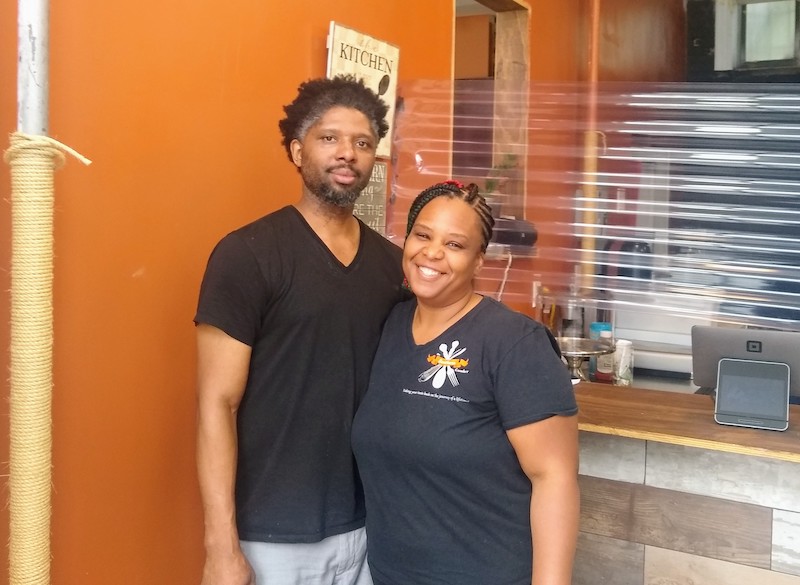
The Southern Comfort is a soul and seafood restaurant located on 377 Marcus Garvey Boulevard in Bedford-Stuyvesant. They gave out free food, music courtesy of DJs that volunteered their time, drinks, and sweets donated by neighboring Black-owned business, Heavenly Crumbs.
“A lot of us really don’t celebrate the 4th of July because of its independence, but I think we could have a day like an independence that celebrates us,” said S. McDonald, “We want it all. We want the opportunity to tell our sons that you can be all that you can be and mean it. We don’t want to raise our children in fear so until we get that time, we want all the days.”
Although the vast majority of Black people in the time period before and after the Reconstruction Era (1865 to 1877) struggled merely to survive slavery, or in some cases being free, Black businesses were not uncommon. Blacks in urban and rural areas worked to establish enterprises and did so as slave entrepreneurs and then, following emancipation, as freedmen. Black business owners, despite enormous historical hardships, economic potholes, systemic racism, and outright “white hostility and violence” that burned or bombed their livelihoods, have overcome and continue to make impressive strides in the business world.
Being Counted and Cured
Brookdale Hospital in Brownsville, which is part of the One Brooklyn Health System or OBHS (Brookdale, Interfaith and Kingsbrook Jewish Medical Center), hosted a ‘Census Day’ for all their staff since receiving a grant from the city to increase awareness for the census. Vice President of External Affairs for OBHS Khari Edwards, staff, and hospital volunteers stood in the main lobby with several stations of ipads, flagging down anyone to electronically fill out their census forms. Each person stopped was given giveaways, balloons, snacks and raffles.
They chose Juneteenth for their ‘Census Day’ because most of the predominantly Black staff works at the hospital and also lives within the surrounding community.
In 1862, the first federally-funded hospital to treat slaves, called the Freedmen’s Hospital, was established in Washington, DC. Prior to that both Black doctors and patients were excluded from most hospitals, which “contributed to the poor health status of the [Black] community.” After the Civil War, it fueled the movement for more representation of Blacks in healthcare that was nonexistent at the time.
Brookdale, like so many others since, is following in those footsteps.
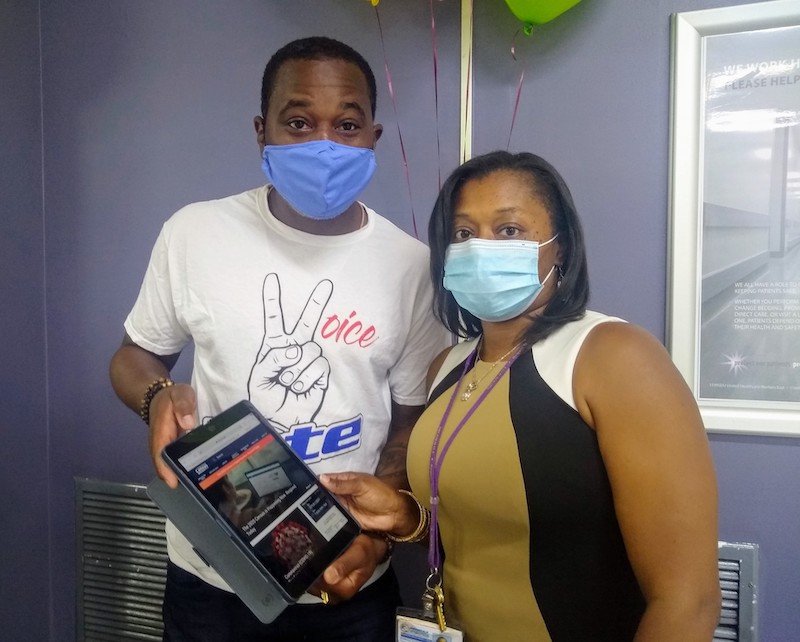
“Some of our union members actually live in shelters even though they earn a living wage,” said Edwards. “We can actually have a voice in changing, that’s why doing the census here in this lobby, in the biggest employer in this community, is important.”
The neighborhood of Brownsville has always been notoriously undercounted in the census, a pattern many worried was doomed to repeat itself this year because of extenuating circumstances. However, Black people altogether have a history of being undercounted in the U.S.
The 1860s marked the redesigning of the Census to finally omit the “slave questionnaire” present since the first census in U.S history was taken in 1790.
This came after the debated Three-Fifths Clause, which counted every five slaves as three, essentially reducing Black persons to less than a whole person in 1787, and endeavored to use slave numbers for the purposes of electoral advantage.
Jubilation
Borough President Eric Adams in partnership with Councilmember Farah Louis (East Flatbush, Flatbush, Flatlands, Marine Park, and Midwood), Councilmember Ydanis Rodriguez (Washington Heights, Inwood and Marble Hill), Assemblymember and Party Chair Rodneyse Bichotte, and Council Majority Leader Laurie A. Cumbo hosted a ‘Freedom Day Rally’ on the grand steps of the Brooklyn Public Library to celebrate Juneteenth with youth music and performances.
In what could be called an encapsulation of Black Southern traditions, all-Black drumlines banged their drums to choreography, fraternities with sharp movements whipped out canes to accompany their dances, singers belted out the negro anthems while preachers prayed, spoken word artists spat poetry, and every speech was delivered from the heart or yelled to the masses.
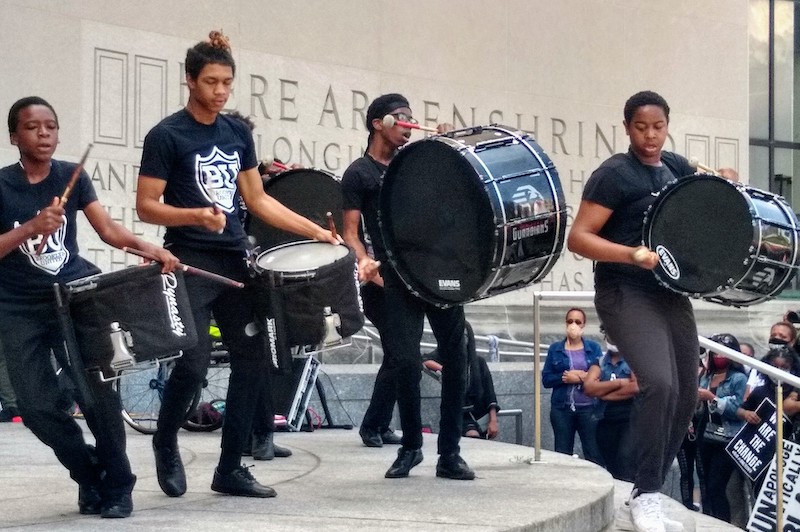
African American music is original American music, whose sound and instruments were born out of the Transatlantic slave trade, centuries of enslavement, Reconstruction, and Jim Crow. Genres made popular in later decades by Black musicians, such as hip hop, rhythm and blues, gospel, rap, rock, and country, stem from African American folk and religious music. These “musicianers,” as they were referred to, were essential to furthering and maintaining Black culture.
“This moment right now is rife with opportunity,” said Cumbo. “We’ve never truly been free in America and that’s what this movement is about today. It’s a reminder that we’re not truly free and there’s so much work that needs to be done.”


